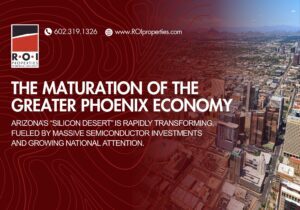It has been a year since the words coronavirus and COVID-19 entered the global lexicon. 2020 represented a challenging 11 months for much of the commercial real estate market, although many of the effects from the pandemic were accelerations of existing trends. (See our Great Acceleration blog series.) With the easing of restrictions—and the promise of achieving herd immunity through vaccinations and recovery from infections—R.O.I. Properties is optimistic that 2021 will see improvement in Phoenix’s economic prospects. At the same time, certain segments of Phoenix commercial real estate can expect lingering challenges, including loan defaults that evolve into distressed real estate, as well as outcomes such as REO and receiverships.
This is a fast-moving market, and predicting the future is tricky if not impossible. Factors such as unemployment, stimulus payments, and moratoria on forbearances and foreclosures make it even more difficult—let alone what happens with the coronavirus. With that in mind, the current trends give some insight into our possible paths ahead. Here’s a brief overview of how we view the state of the various market sectors in the coming months:
Hospitality and Entertainment
These asset classes (along with retail) were the most immediately impacted by the pandemic. From the outset, we saw a significant increase in non-performing loans and actual and potential loan defaults for loans collateralized by hotels, motels, restaurants, theaters, gyms, and just about any element of travel, hospitality and entertainment. We believe, however, that there is significant pent-up demand for travel and all forms of entertainment, and we anticipate a strong bounce back as the year evolves. In particular, the popularity of working from anywhere (WFA) will be a benefit for travelers. It’s interesting to note that Airbnb has taken a stronger position than many hotels, simply as a result of more flexibility and the ability of guests to stay longer term. Long-term hotels are seeing a wave of investor interest for repurposing into other uses, such as apartments and low-income housing.
Retail
The bricks-and-mortar segment of this asset class has further struggles ahead after COVID-19 appears to have changed retail forever. Online ordering offers convenience and much broader options to satisfy consumers needs, at their fingertips. Locations that have embraced internet-based purchasing are in better shape than those with storefront-only. There are numerous success stories of internet native retailers such as Warby Parker, Bonobos, and UNTUCKit, which are incorporating brick and mortar locations into their strategies, as consumers like to touch/feel before buying. This year is likely to see further repurposing of properties and mixed-use solutions, such as healthcare locations within neighborhood centers, special use facilities being incorporated into big box locations, and residential components incorporated into regional shopping centers. Another example is co-working facilities incorporated into regional malls to drive retail and hospitality traffic, such as Industrious in Scottsdale Fashion Square and elsewhere across the country.
Office
While the impact on office space was not immediate, as many decisions are on hold until lease renewal, we believe that this asset class will see long-term challenges in addition to potential for distressed office properties in the coming months. Businesses are utilizing and occupying offices differently. Less in-person presence is required, but employees and employers will still see a need for collaboration, perhaps on a rotational basis, with social distancing and hygiene requirements addressed. Garden offices seem to be the highly desirable “new normal” with less “touch” common areas, etc. We believe that many employers, whether tenants or owners, will reduce the size of their footprint over time, but include more highly amenitized state-of-the-art spaces within their offices.
Industrial
Greater Phoenix industrial real estate shows no signs of stopping in 2021, as we noted recently in “A New Kind of Industrial Revolution Arrives in Phoenix.” A lot of product is under construction, particularly along the 303 and I-10. One trend to watch is so-called last-mile distribution, which caters to the need to get closer in town—today’s consumer expects everything quickly. Amazon is setting the bar high here, with distribution centers throughout the Valley.
Multifamily
After going strong for several boom years, Phoenix leads the country in apartment construction. As we have cautioned previously, the Greater Phoenix area has 20,000+/- units under construction and in the pipeline, and the market will eventually cool off. From R.O.I.’s perspective, Class A projects are the most overbuilt, but investors are still flowing in. Add it all up, and it’s difficult to predict what will happen in this space.
What to Expect When Investing in Phoenix Commercial Real Estate
Greater Phoenix continues to attract attention from investors from California and elsewhere, in addition to home-grown capital, so it is a competitive environment for buyers—and potentially a good time for sellers to exit. On a national basis, about $200 billion sat on the sidelines last year, and investors are eager to deploy it.
As a result, expectations for bargain hunting should be moderated as the market recovers. Many of the asset classes have already been hit hard, and it will be a tight window if you’re looking for distressed properties. This will likely require a targeted approach to succeed, looking for one-off deals in smaller assets and businesses that have been impacted.
R.O.I. Properties specializes in representing investors, owners, lenders and fiduciaries in buying, selling and leasing commercial real estate throughout the Greater Phoenix market and the state of Arizona. If you need help managing distressed properties—or are interested in investing in them—we are full service real estate brokers who handle all commercial asset classes, and serve as Fiduciaries through court appointments as Real Estate Special Commissioner/Special Master and REO broker. To put an expert advocate on your side, contact us at [email protected] or 602-319-1326.










